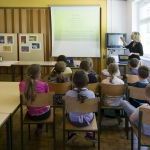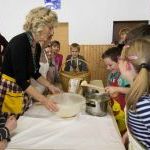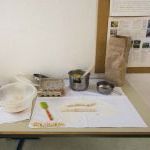Grandma Knows (Best)
Ecologists without Borders run a project to reduce food waste and raise awareness around elderly care homes and schools. The project includes workshops for the elderly and school kids which aim is to encourage intergenerational cooperation and the passing down of lost and forgotten practices of frugal food use.
Website
Useful links
Food for Life's Get Togethers project aims to bring generations together through cooking and growing activites
Country
Media
Photos: Maša Kores
* TOP TIP *
'Link with your local care home and talk to the residents to find out how they cooked when they were young'
How is the project linked to climate change and sustainability?
Elderly people are teaching children about forgotten practices of frugal use of food. They grew up at a time when there was no abundance of food and it had to be used wisely. Few children in the developed world have this knowledge anymore. If people would buy only what they need and use food frugally, we would have less food waste, we would use less energy for food growing, production, transportation, storing, and preparing. We would have less CO2 in the atmosphere and other gases that produce the greenhouse effect. This improved cooperation and knowledge transfer is vital for a successful change of habits when it comes to natural resource use.
Who is involved?
The project is run by Ecologists without Borders together with the Network of Associations for the Elderly, elderly homes and elderly people, hospitals, school children, teachers and the public. Ecologists without Borders help organisatons and schools as lecturers and experts in the field of making changes.
How are participants involved?
Ecologists without Borders and the Network of Associations for the Elderly created intergenerational workshops about frugally use of food for school children with elderly women from care homes. Grandmas and elderly women spoke about wasted food in the schools, about the eatring habits in their youth, how they never wasted food, and how to use it for a tasty meal made from leftovers. Children were interested to hear about forgotten practices in the frugal use of food.
In one of the schools children with grandmas and elderly women had prepared tasty dishes from leftovers and booklet of recipes. Both groups enjoyed the workshops – elderly women liked sharing memories and knowledge with the young, and children had fun creating meals of their own. The public was involved in an awareness raising campaign in a Slovenian premiere of the documentary 'Just Eat It'. Screenings were organised with cooperation of Network of Associations for the Elderly. Ecologists without Borders continue with their activities in the field of wasted food, and the use of leftovers. They connect with different companies and schools as lecturers and advisers in introducing the changes.
Key steps:
Here are some key points to consider if you are setting up a project like Grandma Knows.
- Think about who would be in charge of this programme in your school - the teachers or mentors
- Explore possible cooperation with elderly care homes nearby or ask your children if their grandmas would like to cooperate in a project
- Inform the parents and wider school community about your plans - you never know who may come forward to take part
- Prepare a draft plan for a workshop – will there be also cooking or just a conversation among children and grandmas?
- Will it take a place at your school or will you go somewhere else?
- Can you invite local chef to cooperate as well? Will you prepare a book of recipes?
- Invite grandmas and elderly women who want to cooperate and present them a draft - ask them for the opinion and advice.
- Prepare a programme of workshops, invite all stakeholders.
- Document your work, make some nice photos, ask children, grandmas and chef about their impressions
- Prepare an exhibition and present your work to the others in school, parents and the public – invite journalists



